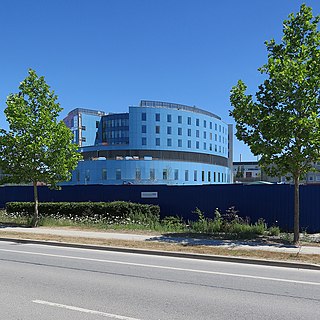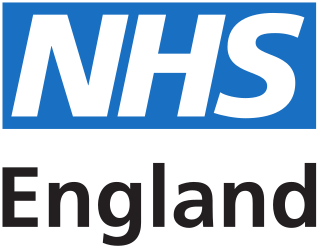
NHS Scotland, sometimes styled NHSScotland, is the publicly funded healthcare system in Scotland and one of the four systems that make up the National Health Service in the United Kingdom. It operates 14 territorial NHS boards across Scotland, supported by seven special non-geographic health boards, and Public Health Scotland.

Chase Farm Hospital is a hospital on The Ridgeway, in Gordon Hill, Enfield, run by the Royal Free London NHS Foundation Trust.

The East of England Ambulance Service NHS Trust (EEAST) is an NHS trust responsible for providing National Health Service (NHS) ambulance services in the counties of Bedfordshire, Cambridgeshire, Essex, Hertfordshire, Norfolk and Suffolk, in the East of England region. These consist of approximately 6.2 million people across an area of 7,500 square miles (19,000 km2).

The West Midlands Ambulance Service University NHS Foundation Trust (WMAS) is responsible for providing NHS ambulance services within the West Midlands region of England. It is one of ten ambulance trusts providing England with emergency medical services, and is part of the National Health Service.

Royal Papworth Hospital is a specialist heart and lung hospital, located on the Cambridge Biomedical Campus in Cambridgeshire, England. The Hospital is run by Royal Papworth Hospital NHS Foundation Trust.

University Hospital Coventry is a large National Health Service (NHS) hospital situated in the Walsgrave on Sowe area of Coventry, West Midlands, England, 4 miles (6 km) north-east of the city centre. It is part of the University Hospitals Coventry and Warwickshire NHS Trust, and is the main hospital covering Coventry and Rugby. It works in partnership with the University of Warwick's Warwick Medical School. It has a large, progressive accident & emergency department providing a trauma service to Coventry and Warwickshire.
Nottingham University Hospitals NHS Trust (NUH) is one of England's largest acute teaching trusts. It was established on 1 April 2006 following the merger of Nottingham City Hospital and the Queen's Medical Centre NHS Trusts. They provide acute and specialist services to 2.5m people within Nottingham and surrounding communities at the Queen's Medical Centre (QMC) and the City Hospital campuses, as well as specialist services for a further 3-4m people from across the region.

Emergency medical services in the United Kingdom provide emergency care to people with acute illness or injury and are predominantly provided free at the point of use by the four National Health Services (NHS) of England, Scotland, Wales, and Northern Ireland. Emergency care including ambulance and emergency department treatment is only free to UK residents and a charge may be made to those not entitled to free NHS care.

Healthcare in the United Kingdom is a devolved matter, with England, Northern Ireland, Scotland and Wales each having their own systems of publicly funded healthcare, funded by and accountable to separate governments and parliaments, together with smaller private sector and voluntary provision. As a result of each country having different policies and priorities, a variety of differences have developed between these systems since devolution.

The National Health Service (NHS) is the publicly funded healthcare system in England, and one of the four National Health Service systems in the United Kingdom. It is the second largest single-payer healthcare system in the world after the Brazilian Sistema Único de Saúde. Primarily funded by the government from general taxation, and overseen by the Department of Health and Social Care, the NHS provides healthcare to all legal English residents and residents from other regions of the UK, with most services free at the point of use for most people. The NHS also conducts research through the National Institute for Health and Care Research (NIHR).

The National Health Service (NHS) is the conglomerate name for the publicly funded healthcare systems of the United Kingdom, comprising NHS England, NHS Scotland and NHS Wales. Health and Social Care in Northern Ireland was created separately and is often locally referred to as "the NHS". The original three systems were established in 1948 as part of major social reforms following the Second World War. The founding principles were that services should be comprehensive, universal and free at the point of delivery—a health service based on clinical need, not ability to pay. Each service provides a comprehensive range of health services, provided without charge for people ordinarily resident in the United Kingdom apart from dental treatment and optical care. In England, NHS patients have to pay prescription charges; some, such as those aged over 60, or those on certain state benefits, are exempt.
NHS targets are performance measures used by NHS England, NHS Scotland, NHS Wales, and the Health and Social Care service in Northern Ireland. These vary by country but assess the performance of each health service against measures such as 5 hour waiting times in Accident and Emergency departments, weeks to receive an appointment and/or treatment, and performance in specific departments such as oncology.

Hinchingbrooke Hospital is a small district general hospital in Hinchingbrooke near Huntingdon, Cambridgeshire. Opened in 1983, it serves the Huntingdonshire area, and has a range of specialities as well as an emergency department and a maternity unit. The hospital is managed by the North West Anglia NHS Foundation Trust.
Circle Health Group is a private healthcare provider in the United Kingdom, co-founded in 2004 by former investment banker Ali Parsa and consultant ophthalmologist Massoud Fouladi. The company is currently led by former lastminute.com Finance Director Paolo Pieri. Circle began with independent hospitals near Bath and Reading, and now has hospitals in England, Wales and Scotland, together with two in China.
United Lincolnshire Hospitals NHS Trust is an NHS trust which runs County Hospital Louth, Lincoln County Hospital, Pilgrim Hospital in Boston, Skegness and District Hospital, and Grantham and District Hospital.

NHS England, officially the NHS Commissioning Board, is an executive non-departmental public body of the Department of Health and Social Care. It oversees the budget, planning, delivery and day-to-day operation of the commissioning side of the National Health Service in England as set out in the Health and Social Care Act 2012. It directly commissions NHS general practitioners, dentists, optometrists and some specialist services. The Secretary of State publishes annually a document known as the NHS mandate which specifies the objectives which the Board should seek to achieve. National Health Service Regulations are published each year to give legal force to the mandate.

University Hospital of North Durham is an acute care hospital built to replace the older Dryburn Hospital on the same site. It is managed by the County Durham and Darlington NHS Foundation Trust.
Moorfields Eye Hospital NHS Foundation Trust is an NHS foundation trust which runs Moorfields Eye Hospital.
Healthcare in Cornwall was until July 2022 the responsibility of Kernow clinical commissioning group, a National Health Service (NHS) organisation set up by the Health and Social Care Act 2012 to organise the delivery of NHS services in England. As far as the NHS is concerned, Cornwall includes the Isles of Scilly.
Healthcare in the West Midlands was, until July 2022, the responsibility of five clinical commissioning groups: Birmingham and Solihull, Sandwell and West Birmingham, Dudley, Wolverhampton, and Walsall.













